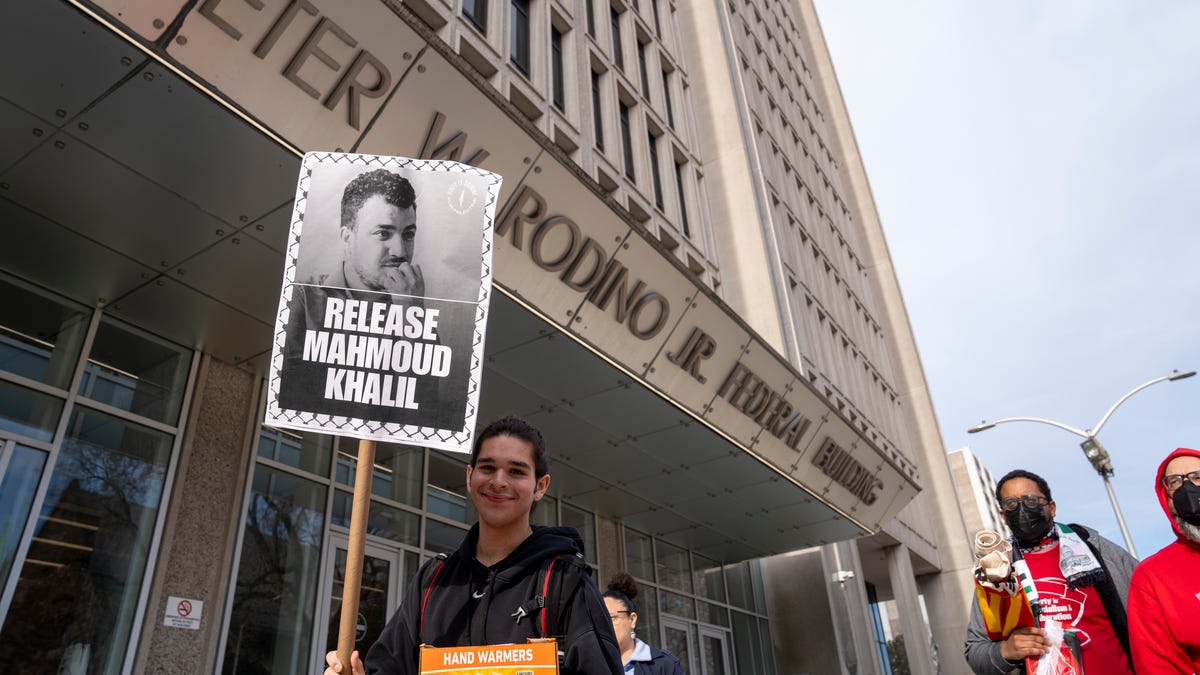Mahmoud Khalil hearing: See video of activity outside
Scenes outside the hearing of detained Columbia University graduate Mahmoud Khalil at U.S. District Court in Newark on Friday, March 28, 2025.
Immigration agents did not have a warrant when they detained Columbia University activist Mahmoud Khalil in March, the Trump administration conceded in new filings in immigration and federal court on April 24.
The admission contradicts earlier claims by immigration agents, who wrote in their initial arrest report that they had a warrant, even as they repeatedly refused to show one when they took him into custody, said Marc Van Der Hout, a lawyer for Khalil. Van Der Hout said the agents’ actions amounted to “egregious conduct” and that it “should require termination” of the deportation proceedings against Khalil.
“The government’s admission is astounding, and it is completely outrageous that they tried to assert to the immigration judge — and the world — in their initial filing of the arrest report that there was an arrest warrant when there was none,” Van Der Hout said in a statement.
Khalil, 30, was detained March 8 in the lobby of his student apartment building in Manhattan after helping lead pro-Palestinian demonstrations at Columbia University last spring. Though Khalil has not been accused of any crime, the Trump administration has moved to deport him, arguing his presence has “adverse foreign policy consequences” for the United States.
His detainment came amid a crackdown by the Trump administration on pro-Palestinian protests that it has conflated with support for terrorism and antisemitism. Protesters say the government’s allegations are false and an attempt to suppress criticism of Israel.
The Syrian-born Palestinian had a green card granting him permanent residency in the U.S. and has also submitted an asylum application, his lawyers said, who are also seeking bail and his return to New Jersey from Louisiana. He is married to a U.S. citizen, Noor Abdalla, who gave birth to their first child on April 21 while he remained in immigration custody.
‘We now know why they never showed Mahmoud that warrant — they didn’t have one’
In the filing, lawyers for the Department of Homeland Security defended the actions of immigration agents, saying they had “exigent circumstances to conduct the warrantless arrest” because Khalil was a “flight risk.”
“An exception to the warrant requirement exists where the immigration officer has reason to believe that the individual is likely to escape before a warrant can be obtained,” the court document reads.
Khalil “stated that he would not cooperate and that he was going to leave the scene,” the filing states. Khalil was served with a warrant after he was taken to an Immigration and Customs Enforcement office in New York, said DHS lawyers.
Lawyers for Khalil disputed the government’s claim that Khalil was a “flight risk,” calling it a “patent lie” and contradicted by witness testimony and video evidence. A video of the arrest shows Khalil complying with plainclothes officers who do not identify themselves or show a warrant.
“That night, I was on the phone with Mahmoud, [his wife] Noor, and even the arresting agent,” said attorney Amy Greer in a statement. “In the face of multiple agents in plain clothes who clearly intended to abduct him, and despite the fact that those agents repeatedly failed to show us a warrant, Mahmoud remained calm and complied with their orders. Today we now know why they never showed Mahmoud that warrant — they didn’t have one.”
“This is clearly yet another desperate attempt by the Trump administration to justify its unlawful arrest and detention of human rights defender Mahmoud Khalil, who is now, by the government’s own tacit admission, a political prisoner of the United States,” Greer said.
DHS submitted its filing in immigration court in Jena, Louisiana, where a judge ruled April 11 that the Trump administration can move forward with efforts to deport Khalil, who is challenging the government’s order of deportation. It was also sent to the U.S. District Court for the District of New Jersey, where Khalil has a pending federal lawsuit arguing that his detention violates his constitutional rights, including free speech and due process.
